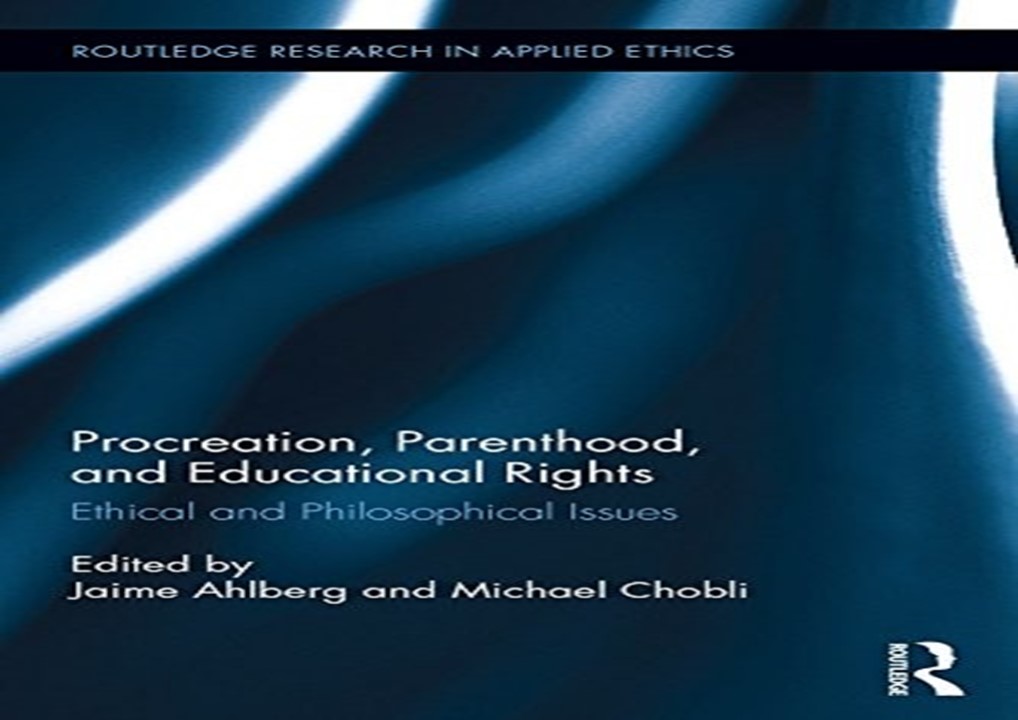PDF_⚡ Procreation, Parenthood, and Educational Rights: Ethical and Philosophical PowerPoint PPT Presentation
Title: PDF_⚡ Procreation, Parenthood, and Educational Rights: Ethical and Philosophical
1
(No Transcript)
2
Procreation, Parenthood, and Educational Rights
Ethical and Philosophical Issues (Routledge
Research in Applied Ethics)
3
Procreation, Parenthood, and Educational Rights
Ethical and Philosophical Issues (Routledge
Research in Applied Ethics)
Sinopsis
Procreation, Parenthood, and Educational Rights
explores important issues at the nexus of two
burgeoning areas within moral and social
philosophy procreative ethics and parental
rights. Surprisingly, there has been
comparatively little scholarly engagement across
these subdisciplinary boundaries, despite the
fact that parental rights are paradigmatically
ascribed to individuals responsible for
procreating particular children. This collection
thus aims to bring expert practitioners from
these literatures into fruitful and innovative
dialogue around questions at the intersection of
procreation and parenthood. Among these questions
are Must individuals be found competent in
order to have the right to procreate or to
parent? What, if anything, can justify parents'
special authority over, or special obligations
toward, their children, particularly children
they biologically procreate? How is the
relationship between the right to procreate and
the right to parent best understood? How ought
liberal societies understand the parent-child
relationship and the rights and claims it gives
rise to? A distinguishing feature of the
collection is that several of its chapters
address these issues by drawing on philosophical
work in the realm of education, one of the most
controversial areas in the ethics of parenthood.
This book represents a distinctive synthesis of
topics and literatures likely to appeal to
scholars and advanced students working across a
wide range of disciplines.
4
Bestselling new book releases
Procreation, Parenthood, and Educational Rights
Ethical and Philosophical Issues (Routledge
Research in Applied Ethics)
5
(No Transcript)
6
COPY LINK TO DOWNLOAD AND GET ABOOK copy link in
description
7
Procreation, Parenthood, and Educational Rights
Ethical and
Philosophical
Issues
(Routledge
Research
in
Applied
Ethics)
copy link in description
Procreation, Parenthood, and Educational Rights
explores
important issues at the nexus
of
8
two burgeoning areas within moral and social
philosophy procreative ethics and
parental rights. Surprisingly, there has been
comparatively little scholarly engagement across
these subdisciplinary boundaries, despite the
fact that parental rights are paradigmatically
ascribed to individuals responsible for
procreating particular children. This collection
thus aims to bring expert practitioners from
these literatures into fruitful and innovative
dialogue around questions at the intersection of
procreation and parenthood. Among these questions
are Must individuals be found competent in
order to have the right to procreate or to
parent? What, if anything, can justify parents'
special authority over, or special obligations
toward, their children, particularly children
they biologically procreate? How is the
relationship between the right to procreate and
the right to parent best understood? How ought
liberal societies understand the parent-child
relationship and the rights and claims it gives
rise to? A distinguishing feature of the
collection is that several of its chapters
address these issues by drawing on philosophical
work in the realm of education, one of the most
controversial areas in the ethics of parenthood.
This book represents a distinctive synthesis of
topics and literatures likely to appeal to
scholars and advanced students working across a
wide range of disciplines.

